Best Vegan Protein Sources
Let’s review the best vegan protein sources for plant-based eaters.
What is Protein?
Proteins, made up of amino acids, are the building blocks of life. We need protein to help repair cells and make new ones.
Protein is essential to the structure of our cells, organic, muscles, connective, tissues and bones and it also plays an important role in metabolism since many key enzymes and hormones, such as insulin, are proteins.
Protein is a Macronutrient
Protein, along with fat and carbohydrates, is a macronutrient, meaning that we need relatively large amounts of it.
Protein differs from fat and carbs, however, in that the body does not store protein, so it’s important that we eat enough protein throughout the day.
More Reading: Vegan Macronutrient Cheat Sheet
Getting all the Essential Amino Acids
The amino acids proteins are made of are found in plant foods such as soy, beans and legumes, nuts, seeds and grains.
You do not need animal products to get all the protein that you need but we do need to be sure we’re getting all the essential amino acids we need and there are 9 such amino acids we need to get through our diet.
There are other amino acids we need to build proteins, however, these are considered nonessential because they’re already present in the body. The body uses these 20 essential and nonessential amino acids needed to form peptides and those peptides are then used to form proteins.
Why do we need protein?
We need protein to build, maintain and repair muscle tissue, but also to synthesize connective tissue, enzymes, hormones, immune system chemicals and more. What else…
- Amino acids (the building blocks of protein). Plant-based eaters need to consume protein from various sources in order to get all essential amino acids in their diet. There is no need to combine proteins as long as you vary your sources daily and weekly.
- Bio-Availability. The body can’t utilize most plant proteins as well as it can animal protein (measured by protein efficiency ration, net protein utilization and protein digestibility score), so plant-based eaters typically need more than omnivores BUT plant protein does come with fibre, antioxidants and phytonutrients that animal protein does not.
- Fat loss. Protein as a macronutrient has the highest thermic effect of food, meaning it requires the most energy to digest. Almost double that of carbohydrates and fats. We burn more calories just by eating it which can be helpful when fat loss is a goal.
- Muscle retention. If fat loss is a goal, adequate protein can help retain as much muscle as possible. As you probably know, muscle burns more calories at rest than fat does, so the more we have and can hold on to the better, and the higher our metabolic rate will be.
- Recovery. Protein aka getting all essential amino acids will aid in repair and recovery not just from exercise but surgery, digestive issues, arthritis and other medical concerns.
- Skin, nails and hair. Adequate protein is essential for healthy hair, skin and nails.
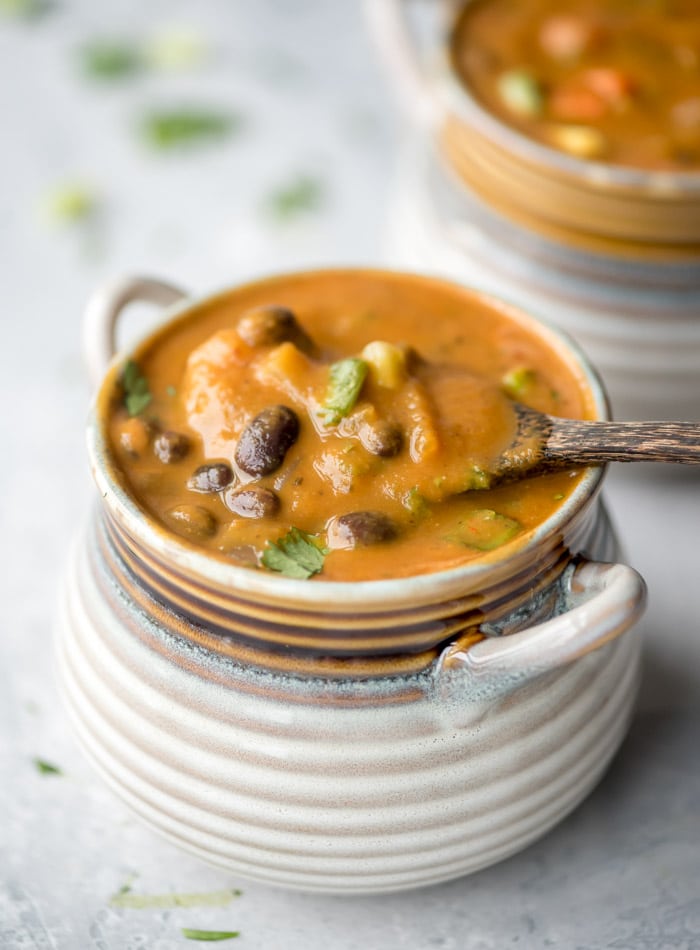
What are Essential Amino Acids?
While yes, it’s important that we get enough protein, the real focus should actually be in getting adequate amounts of the essential amino acids, such as lysine and methionine, needed to build proteins.
Essential amino acids cannot be made by the body, they must be provided by the food we eat. There are 9 such essential amino acids and it’s important that we provide the body these essential building blocks. We can consume essential amino acids throughout the day from a variety of different source.
There’s no need to worry about protein combining either, as long as you eat a variety of vegan protein sources over the course of a few days, your body will draw from them the amino acids it needs.
It doesn’t need to be all in one sitting or even all in one day. However, it’s still important to get your protein from a variety of courses rather than relying on one or two foods.
Importance of Lysine and Methionine
As many plant foods are not complete proteins (containing all essential amino acids), it’s important to eat a wide range of protein sources to make sure you’re getting all the essential amino acids, in particular lysine and methionine.
How to Get Lysine
One particular amino acid to pay attention to if you eat a vegan diet is lysine. Lysine is the least abundant amino acid in plant foods.
Luckily, plant proteins high in lysine are also great sources of many of the other essential amino acids and by eating balanced plant-based diet, you can ensure you’re all of the essential amino acid that you need.
The best sources of lysine are:
- seitan (vital wheat gluten)
- legumes, especially lentils
- soybean products like tofu and tempeh
- quinoa, amaranth
- pistachios, pumpkin seeds
If you do not regularly eat soy, make sure you’re consuming whole grains such as oats, quinoa and whole wheat, nuts such as peanuts, pistachios, cashews and almonds, daily beans and lentils and vegetables such as broccoli.
What does lysine do?
Lysine is responsible for:
- tissue growth and repair
- the production of carnitine
- aiding in calcium absorption, another reason why it’s important for plant-based eaters
- may help reduce feelings of anxiety and levels of the stress hormone cortisol in some people
A deficiency in lysine can lead to nausea, depressed, fatigue and even osteoporosis. This is why it’s so important to include a wide range of whole plant foods to make sure you’re getting what you need.
Every day, think of nuts, seeds, beans, lentils, soy, whole grains, fruits and vegetables. If you want to eat a vegan diet and feel food while doing it, you have to focus on consistently eating from all of these food groups.
How to Get Methionine
Another essential amino acid that vegans need to be aware of is methionine. Methionine can be found in grains in legumes so it’s important to include these foods in your diet regularly. The RDA for methionine for a 160-pound person is 1400 mg.
You can achieve this by consuming whole grains, beans, legumes, nuts and seeds throughout the day with a focus on sunflower seeds, soy products, brazil nuts, oats, figs, whole wheat, seaweed, onions, cacao and raisins.
What does methionine do?
Methionine helps form cartilage in the body through the use of sulfur. People short in sulfur-containing foods may suffer from arthritis and damaged tissues. Methionine also helps with muscle growth and the formation of creatine, which is needed for cellular energy.
Other Essential Amino Acids
The other essential amino acids include histidine, valine, tryptophan, threonine, phenylalanine, isoleucine and leucine. These all play essential roles in countless bodily functions.
If you eat a wide range of the whole foods we’ve already discussed and the foods we will get into below, you will get the amino acids that you need. A varied, whole food plant-based diet is key to success.
Read more about the importance of diversity in our diet in my post on gut health.
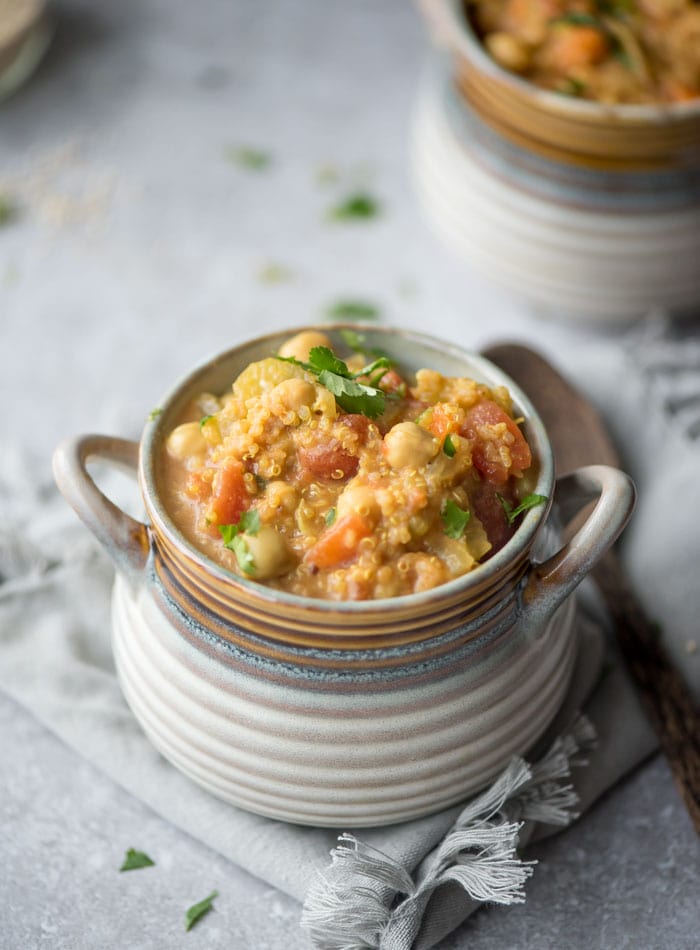
How Much Protein Do you Need?
There is a lot of mixed information about how much protein you actually need but in general, we don’t need as much as you might think.
The US RDA for protein is 0.8 grams per kilogram of body weight or 0.36 grams per pound. This amounts to 55 grams per day for a 150 lb. person, for a sedentary omnivore.
If you’re highly active and a strength or endurance athlete, you’ll need a bit more to support growth and repair than the average person.
Somewhere in the range of 0.55 – 0.7 grams per pound of bodyweight seems to work for most people.
Protein Recommendations
- The American College of Sports Medicine recommends 1.2-1.7 grams of protein per KG of body mass. This amounts to 82-116 grams per day for a 150 lb. person.
- The International Society of Sports Nutrition recommends 1.4-2 grams of protein per KG of body mass. This amounts to 95-136 grams per day for a 150 lb. person.
- Some other research reviews recommend 1.2-2.2 grams of protein per KG of body mass. This amounts to 82-150 grams per day for a 150 lb. person.
As you can see, somewhere in that 0.5-0.8 grams per lb. of bodyweight is the general recommendation for active individuals. Before we continue, let’s take a quick look at what some well-known vegan athletes and supporters of a whole food plant-based diet have to say about protein needs.
Protein Requirement Suggestions
- In The China Study by Dr. T. Colin Campbell, it’s recommended that 10% of your daily calories come from protein however this recommendation is for the average individual and may not apply to athletes. Check out this article for further reading on this.
- In one interview, Brendan Brazier, Vegan ironman athlete, author of multiple books and one of the founders of Vega, says he eats 60-70 grams of protein per day, about half of what would traditionally be suggested for his bodyweight of 160 pounds.
- Michael Greger MD, the author of How Not to Die recommends just 51 grams of protein a day for the average person and says that most Americans get 70% more protein than they need every day. In addition, 97% of Americans don’t reach their daily fibre intake, 98% suffer from potassium deficient diets and most of these dietary deficiencies are a result of an inadequate intake of plant foods.
Bodybuilding Protein Protocols
In the bodybuilding world, protein is considered the key nutrient for developing size and strength, with some athletes eating upwards of 1.5 grams per pound of bodyweight.
The Academy of Nutrition and Dietetics reports that bodybuilders require 1.4 to 1.7 grams of protein per kilogram, or about 0.63 to 0.77 grams of protein per pound of body weight each day, well below the standard 1 gram per pound often used, which can amount to hundreds of grams of protein daily.
Furthermore, nutritionists may take the view that if you eat a well-balanced diet there’s a good chance you’re already meeting your protein requirements without the need to go overboard on meat, egg whites and protein powder, foods consumed in high amounts by most bodybuilders with often negative health implications such as inadequate fibre and micronutrient intake.
Active Individuals Need More Protein
If you’re very active and/or looking to gain muscle, more protein than the 0.36 grams per pound is probably a good idea. For myself, I eat about 0.7 grams per pound and I’m very active in and out of the gym. You just have to see what works for you and go from there.
Books on Protein Needs
- The Protein Combining Myth
- The Great Protein Fiasco
- Proteinaholic: How Our Obsession with Meat is Killing Us
- Slaying the Protein Myth
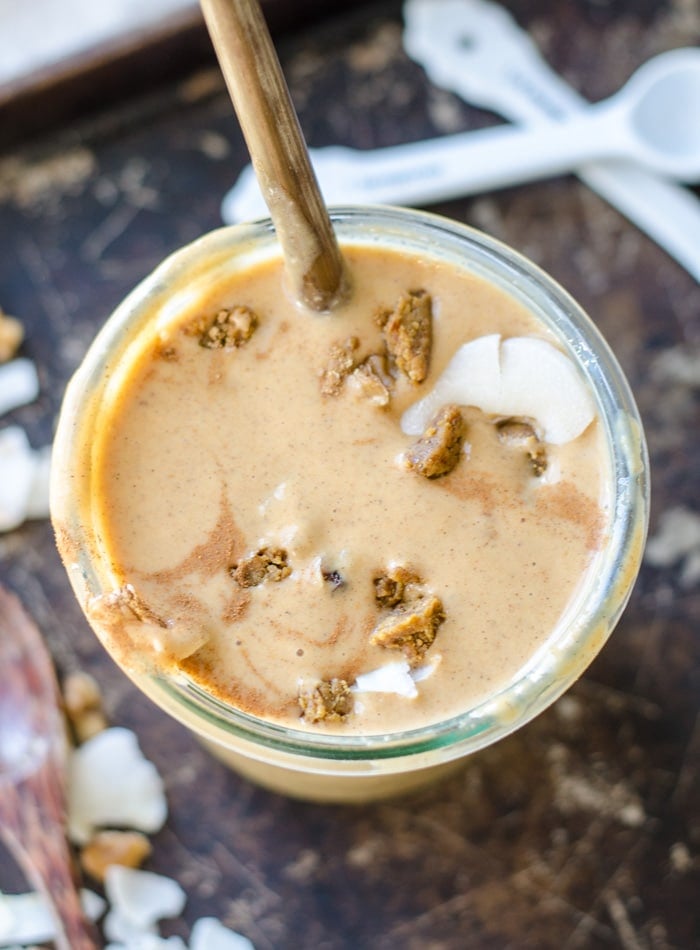
Concerns of a High-Protein Diet
One potential drawback of a high-protein/low-carb diet is a deficiency in essential micronutrients found in carbohydrate-rich foods such as fruits and vegetables. Fruits, vegetables and whole grains contain the vitamins, minerals, fibre and antioxidants that help prevent disease. In addition, high-protein animal foods are high in saturated fat, which increases the risk of heart disease, stroke, diabetes and cancer.
What’s Missing in your Diet?
The American Heart Associated warns that “reducing consumption of carbs usually means other, higher-fat foods are eaten instead. This raises cholesterol levels even more and increases cardiovascular risk.”
They also note that by concentrating on animal protein sources, dieters may consume too much salt and not enough calcium, potassium, magnesium and other important nutrients for our overall health.
Is a High-Protein Diet Damaging?
There are a lot of claims that eating a very high-protein diet is damaging to the kidneys, liver and that it may cause cancer and osteoporosis but these are complicated issues and more research needs to be done.
From what I understand, the issue lies in what we miss out on if we eat a high-protein diet, not necessarily the negative implications of the protein itself and furthermore, the source of that protein seems to be key as in protein from animal sources versus plant source.
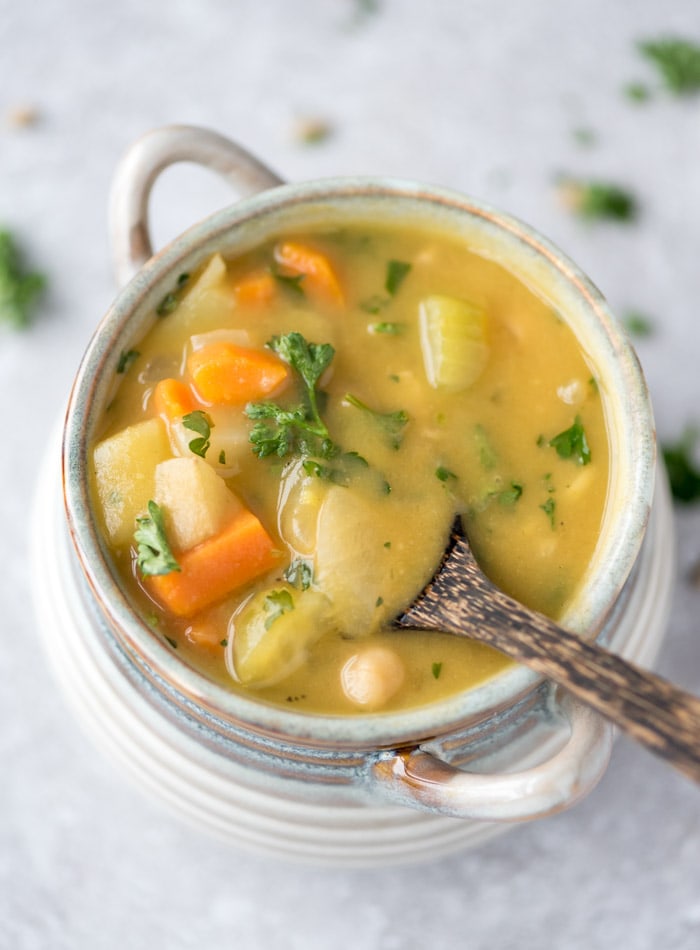
Best Vegan Protein Sources
These foods are the best sources of plant-based protein I include in my diet. By doing so, I’m able to reach the amount of protein I require to support my active lifestyle. Adequate protein is needed to support performance, muscle growth and maintenance, and to encourage recovery.
Whole Food and Lightly Processed Protein Options
Most of these are protein-rich whole foods but I’ve also included a few of my favourite packaged foods such as veggie burgers, vegan sausages, edamame noodles and black bean noodles. I use these foods on occasion but the bulk of what protein I eat is made up of whole food options.
There are a couple of other high-protein vegan foods that I haven’t included in this list as I never include them in my diet but just so you’re aware of them, there is also quorn (mycoprotein) and textured vegetable protein or TVP.
Vegan protein sources are less concentrated in protein than animal sources but by including these foods throughout the day, it adds up quicker than you might think.
You’re never going to find a plant-based protein source like egg white, chicken or tuna but these vegan protein sources contain fibre and loads of micronutrients that animal products do not, making them a healthy and nourishing way to get your protein.
Best Whole Food Vegan Proteins
Here’s a quick overview of the best sources of plant-based protein. We’ll get into more detail below.
- tempeh – 16 grams per 3 oz.
- tofu – 8-15 g per 3 oz. depending on if you use medium, firm, extra-firm etc.
- edamame – 9 grams per 1/2 cup cooked
- soy milk – 7 grams per cup
- nutritional yeast
- spirulina- 2 grams per teaspoon
- hemp seeds – 10 grams in 3 tbsp
- chia seeds – 4 grams in 2 tbsp
- almonds and other nuts and nut butters – 6 grams per 1/4 cup
- pumpkin seeds – 4 grams per 1/2 cup
- rolled oats – 9 grams per 1/2 cup dry
- quinoa – 8 g per 1 cup cooked
- various beans – 7-8 grams in 1/2 cup cooked
- lentils – 9 grams per 1/2 cup cooked
- seitan – 21 grams per 1/3 cup cooked
After we cover these sources, we’ll look at the highest protein vegetables as well as some high-protein packaged foods you can include in your diet. You can also download my free macro cheat sheet below to help you plan a more balanced plant-based diet.
Tempeh
Tempeh is one of my favourite protein sources. It’s a fermented food making it probiotic-rich and good for digestive health. Tempeh is a soy product, as are the following two foods, tofu and edamame.
Tempeh can be enjoyed on its own, in sandwiches, crumbled in soups and chili, in stir-fries or as a substitute for meat in various recipes. I love it dry-fried until crispy and added to salads. Tempeh recipes:
- Stir-Fry with Tempeh and Rice
- BBQ Tempeh Bowls
- Tempeh Bacon Breakfast Bowls
- Baked Tempeh Bowls
- Garlic Herb Marinated Tempeh
- Tempeh Tacos
Protein per serving: 16 grams per 3 oz.
Tofu
You can’t beat tofu as a source of vegan protein. Check out my Real Food Guide to Tofu and Tempeh for all the details on what kinds of tofu to buy, how to use it and more on the nutritional benefits of soy.
- Mediterranean Quinoa Bowls with Tofu Feta
- Avocado Mango Tofu Bowl
- Peanut Tofu Bowl
- Tofu Banh Mi
- Sweet and Sour Tofu
- Orange Tofu
- Cashew Tofu Stir Fry
- Baked Tofu Nuggets
Protein per serving: 8-15 g per 3 oz. depending on if you use medium, firm, extra-firm etc.
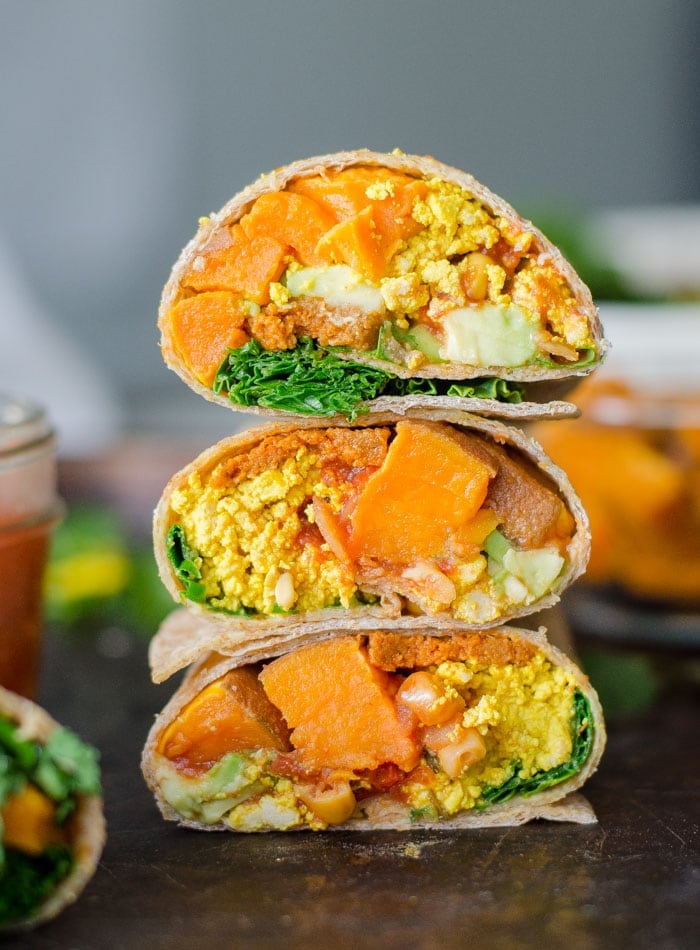
Edamame
Edamame is an unprocessed soybean and is an easy and yummy way to boost your protein intake. You can add it to soups, stews, salads or just eat it as a snack with a little sea salt.
Try it in my high-protein edamame mango salad, tofu edamame bowl, or wild rice and edamame salad.
Protein per serving: 9 grams per 1/2 cup cooked
Nutritional Yeast
Nutritional yeast is another one of my favourites for boosting my protein intake. It’s also fortified with B12, an important vitamin for vegans and plant-based eaters to be aware of. Read more about what nutritional yeast is and how to use it. Try it in my:
- Vegan Peanut Butter Cup Protein Shake
- Cheesy Roasted Broccoli with Vegan Cheese Sauce
- Creamy and Cheesy Vegan Broccoli Soup
- Creamy Cauliflower Wild Rice Soup
- 6-Ingredient Easy Cheesy Vegan Zoodles
Protein content: 6 grams in 2 tbsp
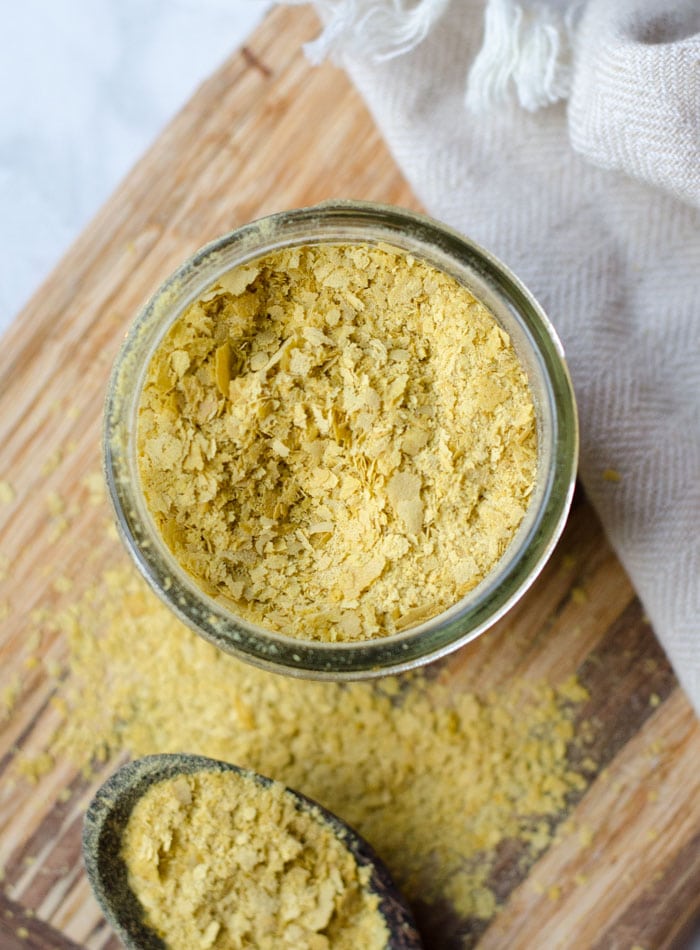
Spirulina
Spirulina isn’t going to account for a huge part of your protein intake but I like adding a couple of teaspoons to my smoothies for a little boost.
It actually has the highest protein content of any food but you don’t consume it in large quantities. Adding 2 teaspoons to your smoothie will provide 4 grams of protein, which doesn’t sound like a lot but it all adds up. You’ll also get about 15% of your daily iron.
Spirulina also has countless other health benefits such as detoxification and anti-inflammatory properties, so I use it either way.
Protein content: 2 grams per teaspoon
Hemp Seeds
Hemp seeds are one of my top suggested healthy foods. They’re anti-inflammatory, high in protein, omega-3 essential fatty acids, iron, vitamin E and more. For a vegan protein source they’re also low in carbohydrates which can be helpful at times.
I also like to use a plain, organic hemp protein powder for bumping up the protein in oats and smoothies. I add hemp seeds to smoothies, oats, salads, dairy-free yogurt, and breakfast bowls and even stir them into soups. Try them in my:
- No-Bake Vegan Hemp Protein Bars
- No-Bake Cinnamon Raisin Hemp Seed Balls
- Grain-Free Coconut Chia Breakfast Bowls
- Raw Zucchini Hemp Seed Hummus
- Tahini Hemp Seed Bars
- Raw Hemp Seed Brownies
Protein content: 10 grams in 3 tbsp
Chia Seeds
I like chia seeds since in addition to their protein content they’re loaded with other nutrients such as omega-3. I’ll add them to smoothies, oats, bars and use them to make chia seed pudding. Try them in my:
- Chocolate Chia Protein Pudding
- Peanut Butter Jelly Chia Seed Pudding
- Sweet and Salty Peanut Butter Chia Seed Pudding
- No-Bake Chocolate Chia Energy Bars
- Chocolate Chia Pudding
- Mango Chia Pudding
Protein content: 4 grams in 2 tbsp
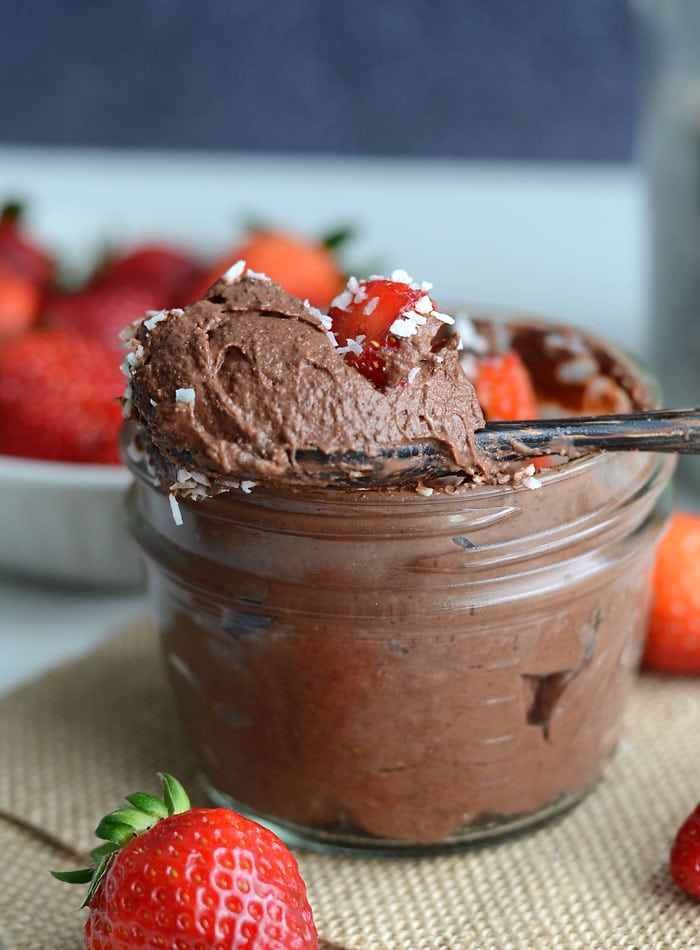
Almonds
Almonds are one of the highest protein nuts and they’re also high in fibre, vitamins and minerals. Raw almonds and almond butter are both good choices for a little hit of protein. Try them in:
Protein content: 6 grams per 1/4 cup
Other Nuts, Seeds and Butters
Pumpkin seeds, sesame seeds, cashews and sunflower seeds all contain protein and other essential nutrients such as zinc, iron and magnesium.
You can eat them raw as snacks, add them to recipes and of course, as nut butter such as almond butter, peanut butter and tahini.
All nuts and seeds contain some protein and are high in many other nutrients so I include at least a few servings in my diet every day.
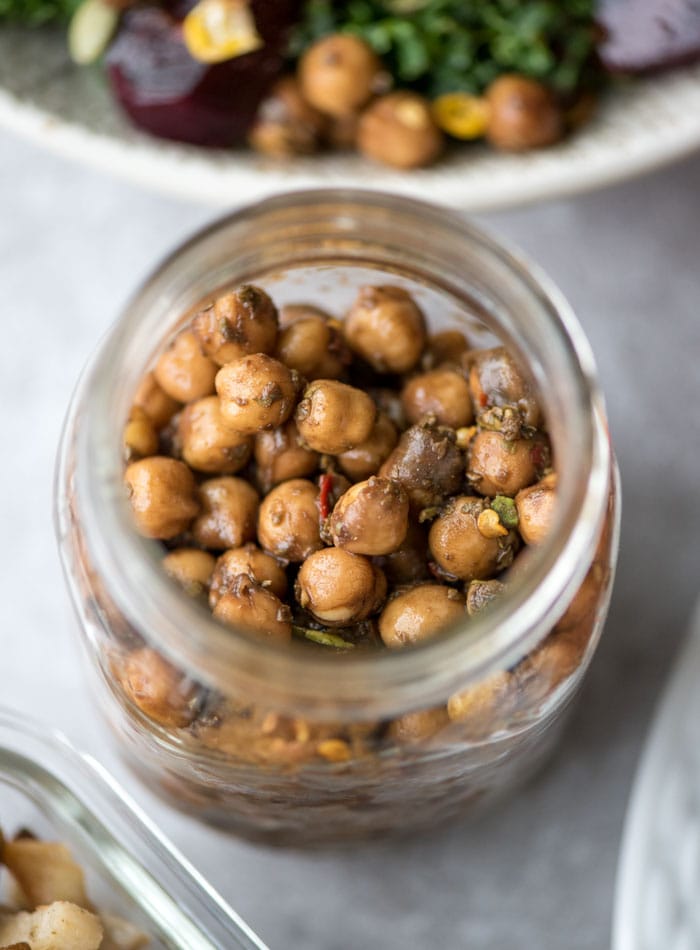
Quinoa
Quinoa is one of the highest protein grains so I like using it as an alternative to brown rice. You can use it for breakfast cereal, in soups and stews, in salads or as a side on its own. It’s versatile, inexpensive, easy to cook and naturally gluten-free. Read more about quinoa in my guide to whole grains. Try it in my:
- Vegan Chickpea Quinoa Stew
- Lentil Quinoa Bowl
- Quinoa Cookies
- Tempeh Quinoa Macro Bowl
- Kale Quinoa Chickpea Salad with Roasted Carrot
- Quinoa Grain Bowl
- Vegan Quinoa Power Bowls
- Quinoa Kale Salad with Roasted Vegetables
Protein content: 8 g per 1 cup cooked
Rolled Oats
You can’t beat oats for a healthy, nourishing plant-based food. There are so many ways to use them, from sweet to savoury. Oats are also anti-inflammatory, high in fibre and minerals and low in fat. Try them in my:
- Vegan Peaches and Cream Oatmeal
- Brownie Batter Overnight Protein Oats
- Flourless Peanut Butter Banana Oatmeal Cookies
- Chia Seed Gingerbread Overnight Oats
- Easy Banana Baked Oatmeal
- Carrot Cake Baked Oatmeal
Protein content: 9 grams per 1/2 cup dry
Other Whole Grains
Brown rice, wild rice, amaranth, teff, buckwheat and freekeh all contain a decent amount of protein and many other essential micronutrients. I would recommend 3-5 servings daily.
Chickpeas
Chickpeas are the bean I use the most in my kitchen. They’re a good source of protein and are high in dietary fibre, manganese, folate, iron, copper and zinc. I love them for making hummus, burgers, soups, stews and salads. Try them in my:
- Vegan Chickpea Quinoa Stew
- Vegan Chickpea Vegetable Chowder
- Vegan Roasted Beet Salad with Marinated Chickpeas
- Vegan Kale Caesar Salad with Roasted Chickpeas
- Kale Hummus
- Vegan BBQ Chickpea Salad
- Teriyaki Chickpea Rice Bowl
- Mediterranean Chickpea Skillet
Protein content: 7 grams in 1/2 cup cooked
Black Beans
Black beans are a good source of protein and many other nutrients. They’re high in fibre, folate, copper, manganese, magnesium, iron and thiamine. Black beans are great in breakfast bowls, in soups, salads, on their own as a side, in burgers and in dips. Try them in my:
- Spicy Vegan Black Bean Soup
- Vegan Black Bean Burritos with Red Rice
- Black Bean Corn Salad
- Black Bean Stuffed Sweet Potatoes
- Black Bean Tacos
- Healthy Vegan Black Bean Brownies
- Black Bean Enchiladas
Protein content: 8 grams per 1/2 cup cooked
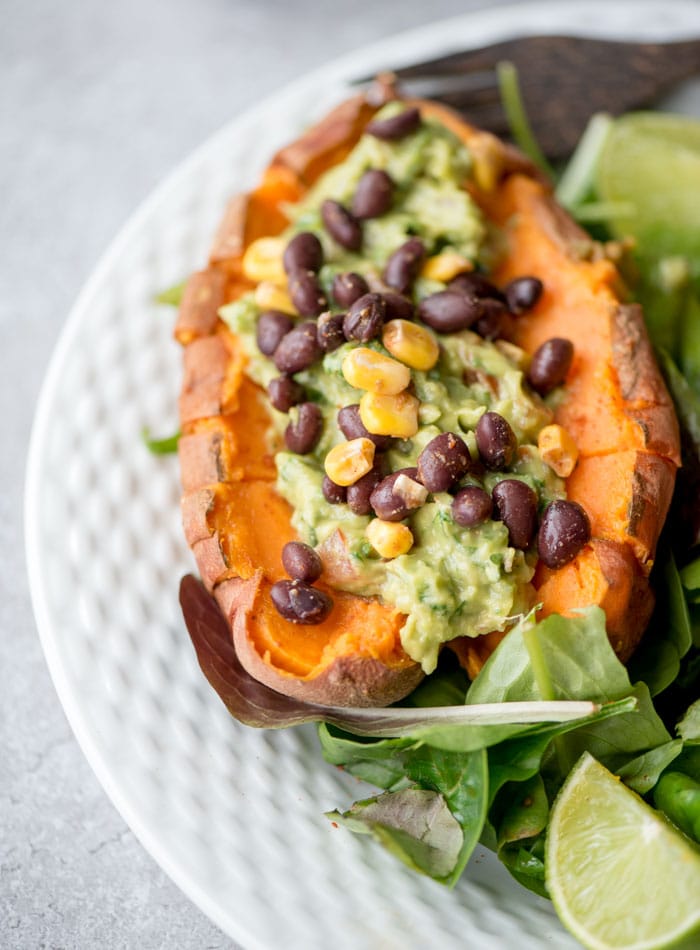
Lentils
Lentils are inexpensive, versatile, healthy, low in fat and high in protein and fibre. Try them in my:
- Red Lentil Tomato Soup
- Lentil Sweet Potato Stew with Kale
- Coconut Red Lentil Dahl
- Curried Butternut Squash Lentil Stew
- Roasted Vegetable Lentil Salad
- Curried Lentil Soup
- Lemon Lentil Soup
- Vegan Lentil Tacos
- Lentil Shepherd’s Pie
Protein content: 9 grams per 1/2 cup cooked
Other Beans
All beans and varieties of lentils are a good source of plant-based protein. Switch things up and try:
- kidney beans
- black-eyed peas
- beluga lentils
- white kidney beans
- pinto beans
- fava beans
Beans are great for making dips such as hummus and homemade veggie burgers such as my vegan chickpea burgers, so there are a ton of ways to use them.
The fibre that beans contain has also been shown to lower cholesterol and blood pressure and help maintain stable blood sugar levels.
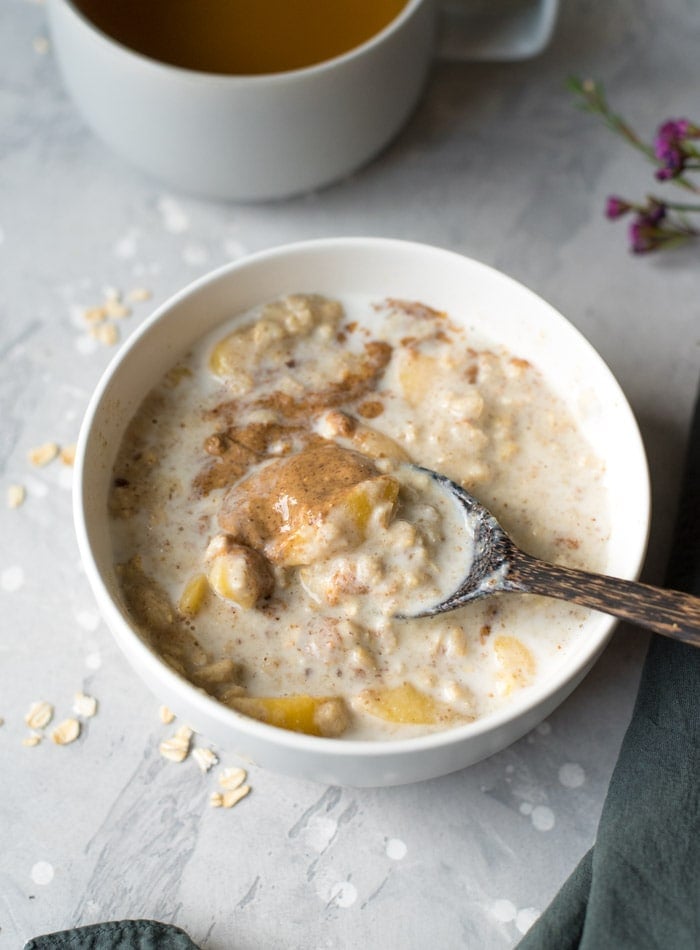
Seitan
Seitan is made from vital wheat gluten and is essentially pure protein.
Cooked seitan has a similar texture to meat so it’s typically used as a meat substitute. It’s very high in protein with little fat and carbohydrate.
Protein content: 21 grams per 1/3 cup cooked
Packaged Vegan Protein Sources
It can be helpful to have these packaged items on hand for quick, higher-protein meals when you need them. Focus on the foods from the whole food list first but know that there are these other options available when you need them.
Explore Asian Noodles
Explore Asian carries a line of bean-based noodles such as black bean or adzuki bean spaghetti, edamame noodles and mung bean noodles. I really like them and they’re a good alternative to wheat noodles if you’re looking for something grain-free, low in fat and high in protein. You can use them anywhere you’d use regular noodles and they work great for Italian dishes or for curries and stir-fries.
Protein content: 25 grams per serving (varies by type)
Banza Pasta
Benza makes a line of chickpea pasta which is really good and I find close to real pasta than the Explore Asian noodles however they’re not as high in protein. You can use them in any pasta or noodle dish.
Protein content: 15 grams per serving
Field Roast Sausage
For store-bought vegan sausages, I like Field Roast the best. They have a clean ingredient list and taste great. You can eat them on their own or add them to stews, chili, salads or even breakfast burritos.
Protein content: 21 grams per serving
Protein Powders
I use a whole vegan protein supplement to reach my protein goals but if you’re not highly active you probably don’t need to supplement with protein powder.
I usually have 1 serving per day of either a pea protein-based powder or powder made from whole food protein sources such as pumpkin, quinoa, brown rice, hemp, chia and alfalfa. I also use plain, organic hemp protein and brown rice protein powders.
My favourite vegan protein powders are Bob’s Red Mill Vegan Protein, Vega Performance Protein, Naked Nutrition Pea Protein and North Coast Naturals Vege Pro-7.
I’ll add 1/2 a scoop to my morning oatmeal, 1/2 a scoop to smoothies and sometimes just drink them mixed with water in a pinch. Try it in my:
- Vegan Peanut Butter Cup Protein Shake
- Brownie Batter Overnight Protein Oats
- 2-Ingredient Vegan Protein Cookie Dough
- Vegan Chocolate Peanut Butter Protein Balls
Protein per serving: 20-30 grams per scoop
I also have a vegan smoothies book with 66 protein-rich recipes that you can check out here.
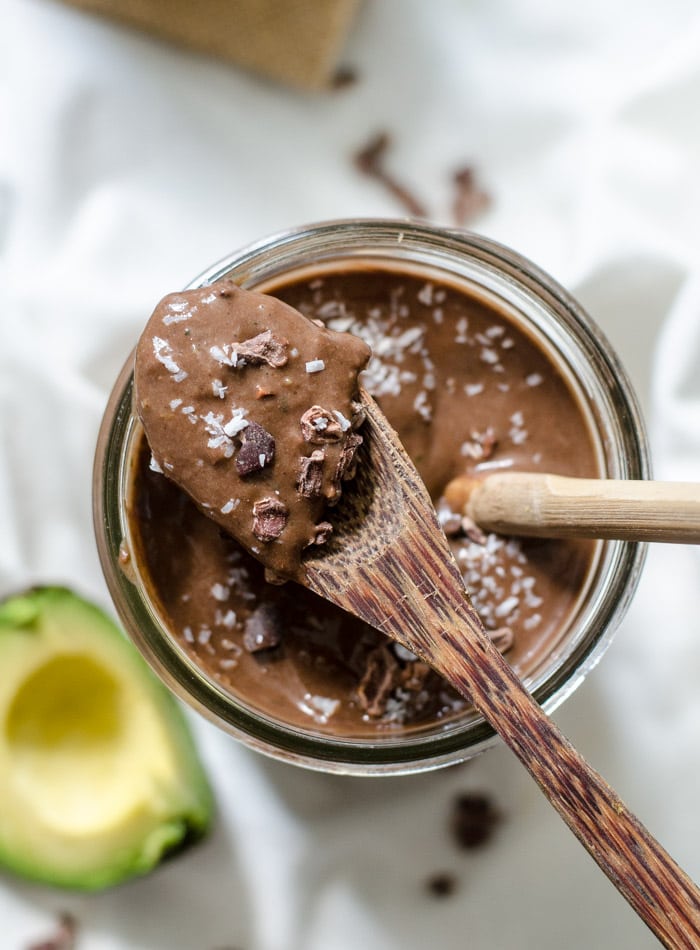
Sol Veggie Burgers
For store-bought veggie burgers, I like ones from Sol. I rarely buy them but they’re handy on occasion if you need a quick protein source for dinner or are camping or going to a BBQ.
We don’t have much of a selection here in Canada for veggie burgers yet and I know there are quite a few other options available in the US, so you can also check your local grocery store to see what’s available.
Protein per serving: 12 grams per serving
Highest Protein Vegetables
Aside from eating these high-protein vegan foods, I try to opt for the highest protein vegetables when I can. Here are the highest protein vegetables. Once you start focusing on them and incorporating them into your diet, the protein really adds up throughout the day.
- Green Peas – 8 grams protein per cup
- Bean Sprouts – 3 grams protein per cup
- Spinach – 1 gram protein per cup
- Kale – 3 grams protein per cup
- Avocado – 2 grams in half an avocado
- Mushrooms – 3 grams protein per cup
- Artichokes – 4 grams in one small artichoke
- Brussel Sprouts – 3 grams protein per cup
- Asparagus – 3 grams protein per cup
- Broccoli – 3 grams protein per cup
Veggie Protein Adds Up
That may not sound like a lot but a few big handfuls of spinach in your smoothie or tofu scramble, a big salad at lunch with roast brussel sprouts and green peas and a stir-fry at dinner with broccoli, mushroom and kale and you’ve just added about 35 grams of protein to your day.
In addition and in contrast to animal protein, you’ll be loading up on dietary fibre, which is so important for keeping us healthy, disease-fighting antioxidants and plenty of essential vitamins, minerals and amino acids.
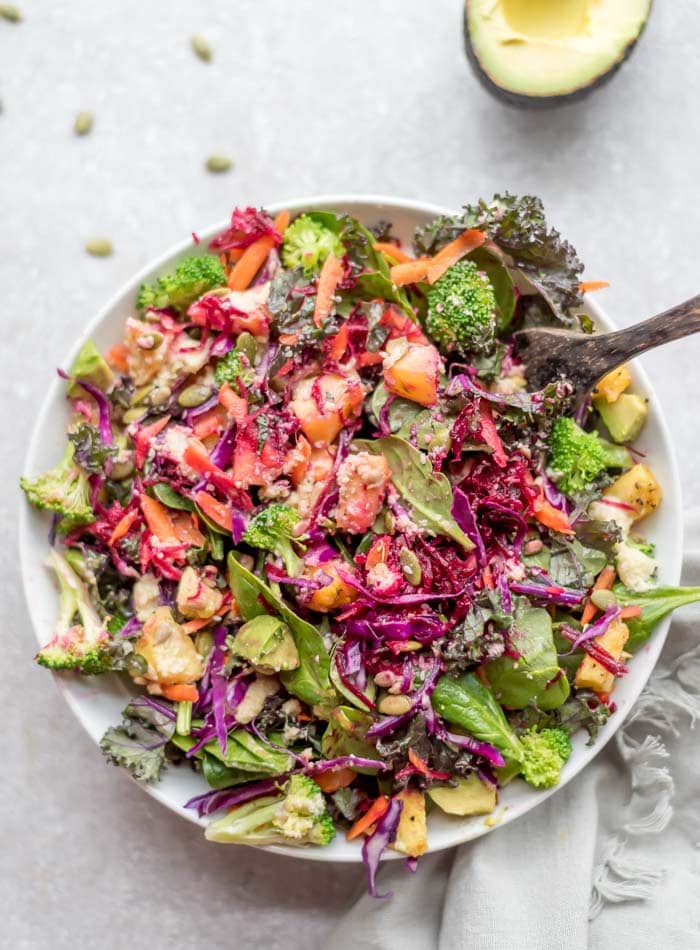
What About Supplements?
There are other factors that come into play on a vegan diet. In particular, B12, vitamin D3 and omega-3 should be taken into consideration.
Iron, calcium and iodine should also be considered however with a focus on a wide range of whole plant foods, you can quite easily get what you need without supplementation.
Vegan Macros: Tips for Hitting Your Protein
Here are a few tips for vegan athletes tracking macros:
- Include a protein source at every meal and snack.
- Eat a range of plant protein sources to make sure you’re getting all your amino acids. Eat your beans, lentils, nuts, seeds, soy, whole grains and vegetables.
- If you’re an athlete, consider supplementing with a whole food protein powder. 1 serving a day should be plenty.
- Consider a vegan fermented BCAA supplement but focus on whole foods first, or look for a protein powder that contains BCAA.
- Reduce your protein intake and increase your carbs to make up for the calories. There is no magic macro numbers so don’t worry so much about it. Consistency is far more important than specific macro ratio.
- Keep focusing on micronutrients. Are you getting enough iron, calcium, iodine, fibre and vitamins?
Vegan Athletes
Not only is it possible to get enough protein but by eating quality, whole food diet, you’ll be able to build new muscle and maintain the muscle you’ve already worked so hard for. Countless high-level competitive athletes have been successful while eating a completely plant-based diet.
From a vegan Olympic weightlifter to strongmen, MMA fighters, NFL players, endurance athletes and bodybuilders, athletes across the board have proven that you don’t require animal protein to reach your fitness goals.
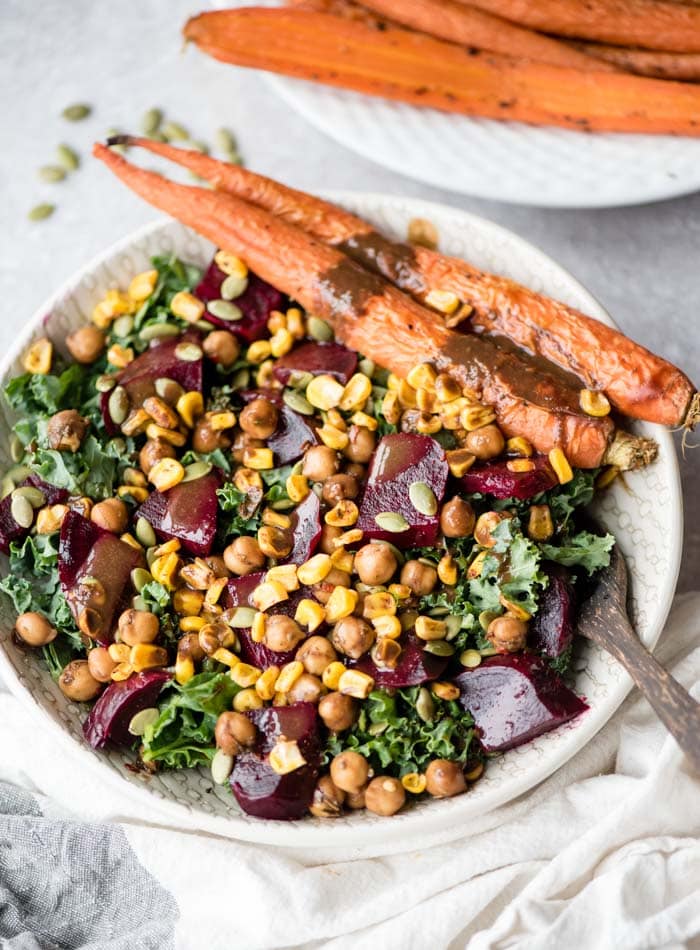
Sample Meal Plan for Vegan Athletes
I put together this one-day meal plan to show roughly how I eat on an average day. This meal plan consists of approximately 2200 calories made up of 120 grams of protein, 270 grams of carbohydrates and 70 grams of fat.
As much as I can, I focus on eating whole foods ensuring the maximum micronutrient intake along with a balanced intake of macronutrients to support my activity levels and performance goals.
I typically eat 4-6 times a day consisting of 1-2 snacks and 4 meals. Some people prefer to eat larger meals and not to snack, it just depends on what your preference is.
I find I get too hungry between meals not to have a snack. One of those snacks is a pre-workout bite I eat at 5 am before training. If it’s a rest day, I would eat 5 times since I don’t need a pre-workout, or save that extra snack for dessert.
I have two other full meal plans you can check out here: 3-Day Whole Food Plant-Based Meal Plan // One-Week Vegan Meal Plan
I also have 2 sample meal plans for athletes in this post.
Upon Rising 4:30 am
First thing when I get up in the morning, I drink 1 L of water with lemon. If I feel like I need some extra hydration, I’ll add a pinch of sea salt.
This helps me re-hydrate after sleeping all night and wakes up the digestive system. At this time I also take my supplements. After I drink my water, I’ll make some tea or coffee and prepare a pre-workout snack if I’m hungry. Sometimes I don’t eat before the gym though.
Pre-Workout Snack
Acorn Squash: baked acorn squash topped with peanut butter and hemp seeds.
Breakfast (Post-Workout)
Oatmeal: oats cooked with chia seeds, vegan protein powder and blueberries then topped with almond butter.
Other options: Vegan Sweet Potato Breakfast Burritos, Breakfast Burrito Bowls, Chocolate Chip Zucchini Overnight Oats, Strawberry Cheesecake Overnight Protein Oats, Grain-Free Coconut Chia Breakfast Bowls, Vegan Chickpea Flour Pancakes, Superfood Chocolate Almond Avocado Smoothie, Vegan Peaches and Cream Oatmeal
Snack
Smoothie bowl: frozen peach, spinach, celery, moringa powder, spirulina powder, zucchini and vegan protein powder. Blend with water until smooth then top with hemp seeds, ground flax seed and chopped walnuts.
Lunch
Buddha Bowl: base of massaged kale, marinated chickpeas, baked tofu, steamed broccoli, grated carrots, grated beets, sunflower seeds, tahini sauce.
Other options: Vegan Roasted Beet Salad with Marinated Chickpeas, Spicy Vegan Black Bean Soup, Creamy Cauliflower Wild Rice Soup, Roasted Squash Salad with Marinated Chickpeas, Red Lentil Tomato Soup
Snack
Smoked Tofu on Rice Cakes: sliced smoked tofu on thin brown rice cakes with cucumber, tomato and cashew cream cheese.
Dinner
Zucchini Noodle Pasta: spralized zucchini noodles, topped with homemade mushroom, carrot, onion, garlic tomato pasta sauce, fresh basil and vegan parmesan.
Other options: Vegan Chickpea Quinoa Stew, Coconut Red Lentil Dahl, 6-Ingredient Easy Cheesy Vegan Zoodles, Spicy Peanut Stew with Rice and Chickpeas, Sweet Potato Peanut Stew, Wild Rice and Broccoli Salad with Edamame, Broccoli Brown Rice Bowl with Almond Satay Sauce
Helpful Articles
If you’re new here, I have a number of posts that are helpful in making the transition to a plant-based diet. I’d suggest giving these a read:


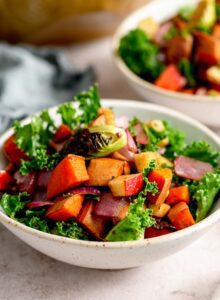
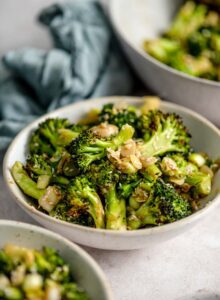
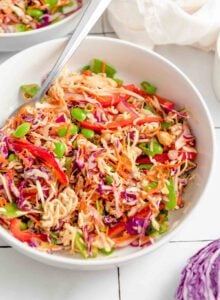
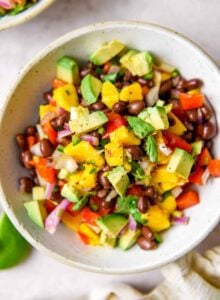
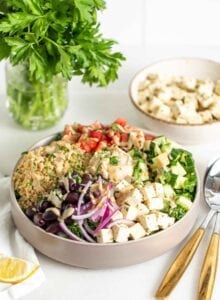
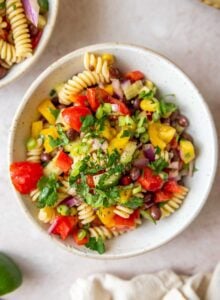
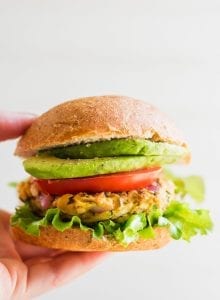
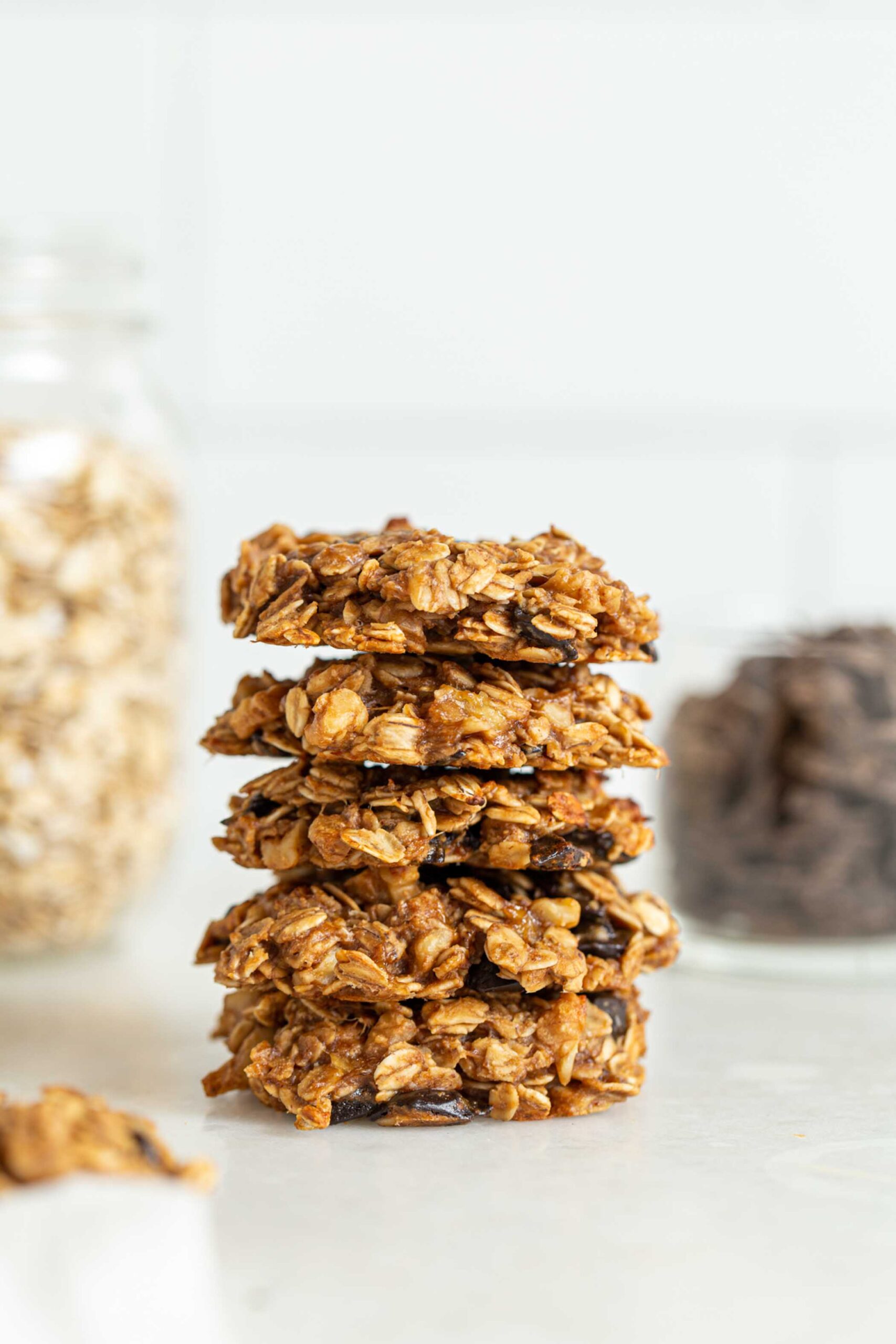
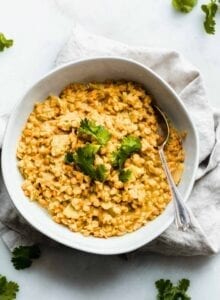
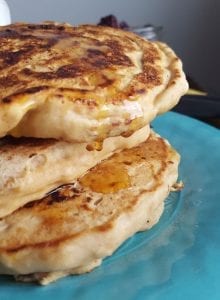
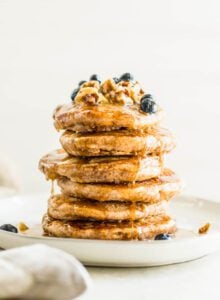
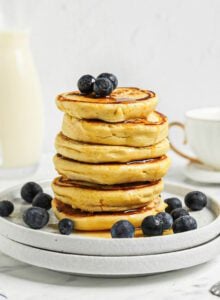
You mentioned that you would only recommend Seitan for occasional use, not a regular part of your diet. Can you explain why? I am allergic to soy, so edamame, tofu and tempeh are out – seitan seemed like the best plant based alternative but your comment gave me pause.
I more meant processed wheat gluten foods. If you have no issues with gluten, go for it!
There is a simple way of figuring out how much protein we need naturally. It is the protein content of human breast milk which is only 2% average. This is enough to triple a baby’s birth weight within one year.
As adults, we no longer grow, and only need to maintain our body and replace old cells, so we definetely do not need any more than this.
Every living organism – plant, animal, human – is made of protein, even green leafy veggies such as lettuce deliver 2% protein. So this is sufficient. In fact, the Swiss doctor Maximilian Bircher-Benner (known for his muesli) has fed babies on RAW greens and fruits. And this is what makes the difference. It is the quality more than the quantity of protein (at least for us who are not in a starving condition). Native protein gets damaged by any form of processing, even cooking. You need some undamaged protein with your food every day – which should be a variety of raw foods incl. raw grains. You cannot make up the damage processing has caused in the protein by eating more ot if. You need to eat it in its natural state. Tempeh etc. is highly processed and concentrated. The German cardiologist Lothar Wendt MD (U of Frankfurt) has discovered that excess protein is one of the causes of arteriosclerosis, it is deposited in an abnormal way in the arterioles and makes the blood thick so your blood pressure needs to be higher for the thickened blood to be circulated. (This condition is reversible by avoiding high protein food such as animal protein, legumes, soy prodcuts).
Can you recommend a good gluten free bread?
I’m not gluten-free so I can’t recommend any. I like Silver Hills, Ezekiel and Dave’s Killer Bread if gluten isn’t a concern.
Why don’t you bake your own bread? You can bake a gluten-free bread of buckwheat and millet. It’s easy and inexpensive to do, and you’ll be sure you got a whole grain bread without any additives.
Yes, of course that’s an option. Baking bread is fun and easy! Good luck!
I’m a little confused by “The best sources of lysine are seitan (vital wheat gluten) and legumes. It can also be found in tofu, tempeh, quinoa, amaranth, pistachios and pumpkin seeds.
The RDA for lysine is 2800 mg and the best sources of lysine is soybeans.”
This is claiming different things are the “best sourcce” could you clarify?
Hi Caleigh, tofu and tempeh are both made from soybeans, making them both a good source of lysine! Same with edamame and miso.
This is a great read; thank you for posting. It’s great to see all the plant based sources for vegans and vegetarians. Regardless of whether people are athletes or not, following a healthy lifestyle can result in improving brain performance as well as increasing energy and mood levels. Adding vegetables or green leafy salads to our meals can have a positive effect on our cognitive function as well as long-term health. Thanks again
I have been eating plant based for almost a year. Recently my blood work showed that my red and white blood cell count was low and that I have my TSH is low . Of course they recommend medication for my thyroid. I know you are not a medical doctor but I would prefer to use food to raise my levels . Can you make any dietary art suggestions ?
Loved the recent article explaining plant based .
Thanks .
GREAT ARTICLE.